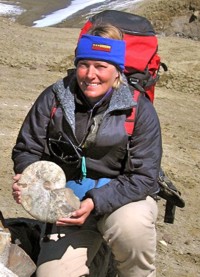S.T. Lee Lecture 2013

When Antarctica was green: Fossil plants reveal Antarctica’s climate history
Professor Jane Francis, 15 August 2013
Dean of the Faculty of Environment, University of Leeds, United Kingdom
View the talk here: 2013 S.T. Lee Lecture
Synopsis of lecture
Although Antarctica is currently covered in ice and snow, paradoxically some of the most common fossils in the rock record are those of plants. They show that life was very different near the South Pole millions of years ago: Antarctica was green. Fossil plants (leaves, wood, pollen, seeds and flowers) show that the continent was covered in lush green forests that flourished in warm humid climates, despite the extreme polar light regime of continuous summer sunlight and long dark winters. Many of the fossil plants are ancestors of vegetation that grows in South America and Australasia today, with some additional tropical types that migrated far south during periods of extreme global warmth. As the polar climate cooled and ice sheets developed, small dwarf shrubs of southern beech (Nothofagus) heroically survived close to the pole before the expanding ice sheets wiped all forests from Antarctica. Will Antarctica become green again as the climate warms?
Jane Francis
Jane Francis is Professor of Palaeoclimatology at the University of Leeds, UK and is currently Dean of the Faculty of Environment. In October 2013 she will take up the post of Director of the British Antarctic Survey in Cambridge.
A geologist by training from the University of Southampton, UK (BSc, PhD), she was a NERC (Natural Environment Research Council) Postdoctoral Research Fellow at the University of London and then palaeobotanist at the British Antarctic Survey. She was an Australian Research Fellow at the University of Adelaide in Australia for five years, before taking up a lectureship at the University of Leeds in 1991. She also held a Royal Society Leverhulme Trust Senior Research Fellowship 2003-04.
Her research interests include ancient climates, particularly of the polar regions. She studies fossil plants from the Arctic and Antarctica to decipher greenhouse climates of the past, when forests, not glaciers, covered the high latitudes. Jane has undertaken many scientific expeditions to the Arctic and Antarctica in search of fossil forests and ancient climates, in collaboration with research teams from the UK, Europe, New Zealand, USA, Australia and Canada. In addition, she has worked in the hot red deserts of central Australia as part of Australian funded research. She was awarded the Polar Medal in 2002 in recognition of her contribution to British polar research.
